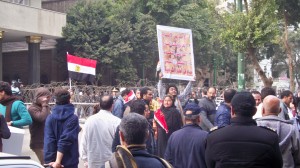Living in any foreign country even during a peaceful time can be problematic, but living in one during a major revolutionary period creates an enormously challenging experience with a unique set of obstacles to overcome. I experienced this not once but three times now country of Egypt.
My first exposure to Egypt’s protests was in May 2011. I spent twenty-one days there. The first revolution had just ended a few months before this with the overthrow of President Mubarak and the horrible loss of over 400 lives. I had followed this event intently on American TV and with my friends online and knew the current situation fairly well. While I was visiting my new friends, protesting was still occurring, but it was peaceful. One day my dear friend and Revolutionary Leader Moustafa Abou Hussein took me to the square, and through his eyes and his words, I relived the historical protests and tragic events that had occurred there. I also shared this day and many others with other Egyptians who were so ecstatic about the forming of their future democracy and were eagerly awaiting new and positive changes in their government and their country. The military was currently in charge, and the general public seemed contented about this. I could feel the hope in the air and the joy felt in the hearts of my new friends. I stayed in a hotel— the Cataract Pyramids Resort– that would later become very special to me. My new friends from Facebook and my new hotel employee friends made me feel very safe and secure. I, too, dreamed of a brighter and more successful future for Egypt and really believed that this was just the beginning of a better life for my friends.
Because I genuinely felt that the violence was over and the transitional period in Egypt was progressing even if it was a little slow, I accepted a teaching position in Cairo and returned to Egypt on November 4, 2011. However, shortly after my arrival, the second revolution began. The youth and other revolutionary leaders were becoming very concerned and disgruntled with the military rule and wanted the election process to be expedited. The school rented me a flat in Garden City which normally would have been a safe and upscale neighborhood, but my flat was three blocks from Tahrir Square—the primary protesting area.
Over the next three months, I would be exposed to many days of the terrible stench from tear gas in my neighborhood, personal physical side effects of watery eyes, burning nasal passages, and difficulty breathing as well as the shrill popping of gunfire and the thunderous explosions of tear gas bombs going off frequently very close to me. My street was often barricaded and closed to public transportation so taxi cab drivers were unable to drive me home, and I eventually was forced to ride the always crowded metro trains. Several times I had to travel through military blockades. This situation did cause me stress and aggravation, but I can honestly say I was not frightened even during one horrific night in December that I literally listened to 12 protesters die and 120 get injured in a gun battle with the police just one half block away from my flat. That event was the saddest one of my entire life. I did not sleep at all that night and literally wept the entire night while the intense battle continued. The constant gunfire, the ear piercing screams of chanting protesters being injured and dying, and the intermittent tear gas explosions lasted for over six hours. My tears were for these brave but poor people—not for myself. For some unknown reason, fear never entered my mind. I knew God would protect me and He did.
The fighting ended, and I discovered to my unbelievable astonishment that the street where the battle had transpired was empty the following morning when I ventured outside to catch a taxi to travel to my school at 8:00 a.m. to teach my eight hour instructional day. The hundreds of people present during the night were replaced with barbed wire fencing blocking the road that led to Tahrir Square. The sight of this brought many more heartrending emotions to the surface, and I began trembling tremendously. I could not stop shaking for three days from the shock I had experienced.
In January 2013, I returned to Egypt with my book in my hand to discover another series of protests and demonstrations and more loss of young lives. This time it was over the dissatisfaction of Egypt’s new president Morsi. I lived many metro stops away from Tahrir this trip but still saw some of the protesting happening. Once again it caused a few problems in traveling around in Cairo, but I did not encounter any significant problems from the demonstrations. However, I could once again deeply identify with the continued struggle of the Egyptians to rebuild their economy and to move on with their lives. Much tension still persists because of these ever present discontented people.
Although I would have preferred to live in Egypt in a more stable environment, I am pleased that I witnessed the strength, the passion, and the never-ending determination of the Egyptian people. It reinforced my respect and admiration for them so much. It also made me more appreciative to be an American and to live in a country where I was able to grow up and work with so many opportunities that I may have taken for granted at times—-opportunities that the youth of Egypt so desire and are demanding now.
Randi D. Ward
May 3, 2013






2 Responses to The Second Revolution in Cairo, Egypt